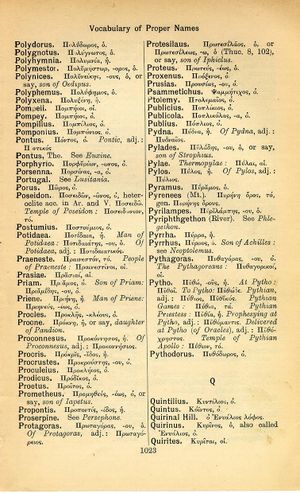Polyhymnia: Difference between revisions
From LSJ
σιγᾶν ἄμεινον ἢ λαλεῖν ἃ μὴ πρέπει → it's better to keep silence than to say what's not appropriate (Menander)
(3_10) |
m (Text replacement - "}}]]" to "}}]]") |
||
| Line 1: | Line 1: | ||
{{WoodhouseENELnames | {{WoodhouseENELnames | ||
|Text=[[File:woodhouse_1023.jpg|thumb | |Text=[[File:woodhouse_1023.jpg|thumb | ||
|link={{filepath:woodhouse_1023.jpg | |link={{filepath:woodhouse_1023.jpg}}]]Πολυμνία, ἡ. | ||
}} | }} | ||
{{Lewis | {{Lewis | ||
Revision as of 10:09, 15 August 2017
English > Greek (Woodhouse)
Πολυμνία, ἡ.
Latin > English (Lewis & Short)
Pŏlyhymnĭa: (Pŏlymnĭa, Poët. ap. Anth. Lat. 1, p. 51 Burm.), ae, f., = Πολυμνία (she of many hymns),
I one of the Muses, Hor. C. 1, 1, 33; Ov. F. 5, 9; Mart. 4, 31, 7; Aus. Idyll. 20.
Latin > French (Gaffiot 2016)
Pŏlўhymnĭa, æ, f. (Πολύμνια), Polymnie [muse des rythmes multiples] : Hor. O. 1, 1, 33 ; Ov. F. 5, 9.
Latin > German (Georges)
Polyhymnia, ae, f. (griech. Πολύμνια, dah. auch lat. Polymnia, Auson. edyll. 20, 7. p. 251 Schenkl), die Gesangreiche, eine der Musen, Hor. carm. 1, 1, 33. Ov. fast. 5, 9. Mart. 4, 31, 7.

